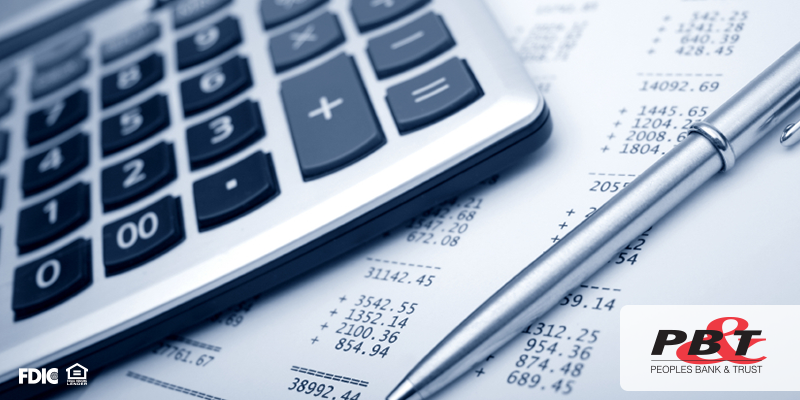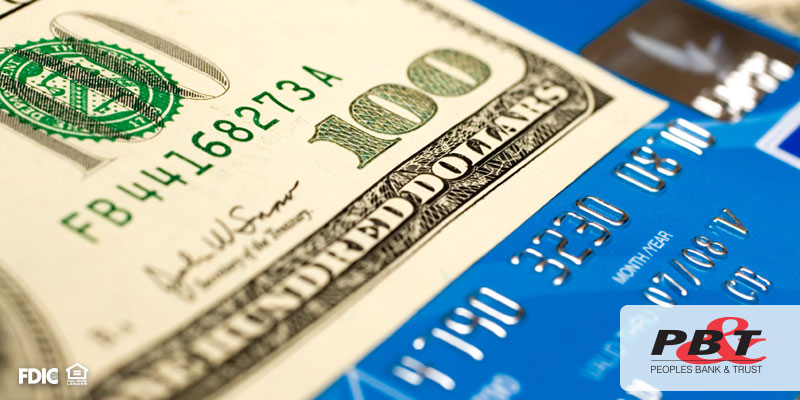
A new year brings exciting opportunities along with the promise of a fresh slate. Start 2017 off on the right foot with these 10 tips from Peoples Bank & Trust Co.:
- $1,000 Emergency Fund. Did you know most Americans do not have the savings needed to cover unexpected expenses or bills? By accumulating a decent emergency fund you have the potential to continue saving instead of withdrawing money from your monthly budget for each unplanned expense. Experts say to start with $1,000 and slowly work your way up to a three to six months’ salary of savings.
- Maximize Your 401(k). Employers who offer a 401(k) benefit often supplement it by matching a percentage of contributions. To take advantage of their FREE matching, start by contributing at least three percent of your income. Over time, increase it to the maximum amount. These funds will continue to grow over the coming decades and help you to build a well-rounded retirement plan.
- Start Saving in an IRA. Similar to the 401(k), an IRA is a great way to help you save money for your retirement. These accounts are not typically provided by your employer, but can be started through a bank or financial adviser. There are two options to choose from: A Traditional IRA or a Roth IRA. A Traditional IRA will allow you to contribute pre-tax dollars and pay taxes upon receiving distributions at age 60. A Roth IRA will let you contribute post-tax dollars, but you don’t have to pay taxes when you receive distributions after age 60. Both options have a limit to how much you can contribute each year, so start with an affordable amount, and slowly work your way up to the maximum.
- File Your Taxes Early. Before the end of the year, every employee should receive their tax forms from their employers. With this information in hand, you can make an appointment with your local tax professional to determine your maximum refund. These funds can then be allocated towards paying down debt, contributing to your IRA, or deposited in your growing savings account.
- Save for Your Child’s Education. Children learn a great deal from their parents. Show them how to save, and get them involved with saving for their own education. By making automated transfers each month, you can ensure that you will have a designated amount to invest in their future. By incorporating this into an account like a Coverdell or 529 Plan, you can help these funds grow tax free. They can then be used for educational expenses like tuition, books, or computer equipment.
- Pay Off Your Credit Cards. Credit cards are notorious for having sky high interest rates. By paying off your debt quickly, you can save money. To help, our convenient calculator can determine how much you need to allocate each month for a debt-free 2017.
- Switch to a Community Bank. Community banks like Peoples Bank & Trust offer impeccable service without the hassle of unwanted fees. Staffed with experienced financial professionals, we have the tools to help you achieve your next financial goal.
- Save 10 Percent. Between your retirement, your child’s education, and your emergency fund, you should be covered for most of life’s unexpected expenses. While it’s great to save for the unexpected, having a fun goal to aim for makes the process more exciting by giving you a tangible experience to look forward to.
- Monitor Your Credit Score. One of the easiest ways to let your credit score dip is to forget about it! Comprised of payment history, number of accounts, and several other factors, one loose bill has the potential to compromise your entire score. The one federally authorized FREE credit reporting site, annualcreditreport.com, allows every American to have one copy of their credit report from all three reporting bureaus. This is a great tool to use annually; however, each month it is a good idea to check and see if there have been any changes. Many credit cards are now offering a service for this to help their consumers keep on top of their score.
- Create a Monthly Budget. Hands down the one change you can make with the biggest impact on your personal finances is to create a monthly budget. By allocating every dollar you earn to a role each month, you can ensure no money is wasted. This will also help you gain better insight into where you’re spending your funds giving you additional opportunities to find savings.
By accomplishing each of these goals in the New Year, you will complete the basic steps to attaining better personal finances. With the help of our dedicated team, you can begin today. Stop by one of our locations and see what your first step could be!
Peoples Bank & Trust Co.
Member FDIC
Equal Housing Lender










